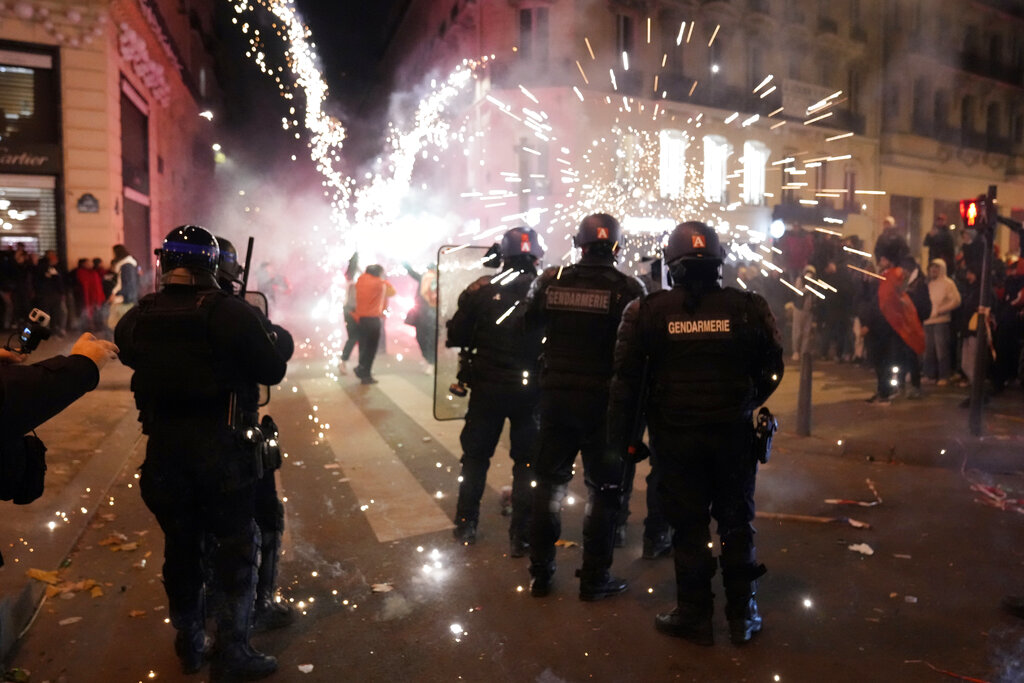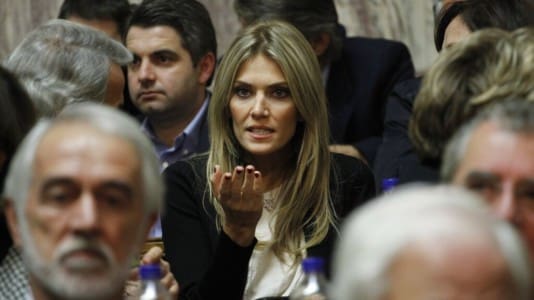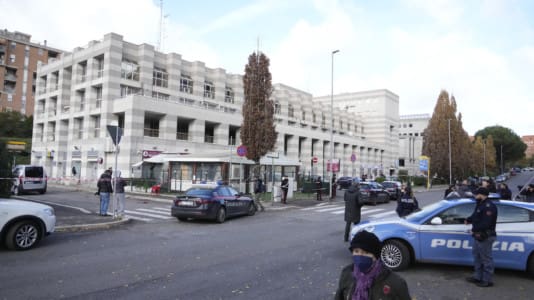From Brussels to Paris, people took to the streets after Morocco’s victory over Portugal in the World Cup, but perhaps the largest gathering featured 20,000 people ot the Champs-Élysées in Paris, with celebrations eventually devolving into running street battles with police.
In videos seen by hundreds of thousands on social media, crowds of revelers are seen throwing bricks and bottles and shooting firework mortars at police, who were forced to don riot gear and charge the crowd to restore order. In the videos, police strike rioters with batons and deploy tear gas.
Le Parisien reports that more than 1,000 police were mobilized on the streets of the French capital, and by evening, several main roads leading into Paris were closed to avoid traffic jams.
Morocco beat Portugal in the World Cup on Saturday 1-0 to reach the semi-finals of the World Cup, and France beat England in the evening’s match, which means France and Morocco will now face off against one another in the upcoming World Cup. The scenes of violence in the capital for a game that did not even involve France playing Morocco are raising fears that the upcoming game could lead to an explosive security situation.
In other French cities such as Lille, police were also attacked by Moroccan fans, who rolled trash bins into police lines and hurled projectiles. Police responded with stun grenades and tear gas.
In Avignon, a video of Moroccan fans looting a truck was uploaded to social media. It is unclear if any arrests were made in connection with the incident.
In Roubaix, Moroccan fans jumped on top of a police vehicle and danced on its roof while officers were attempting to drive through the crowd.
Critics of mass immigration have pointed to the ongoing riots that now occur every time Morocco wins a World Cup match, which have now hit Europe four times and have struck Italy, Belgium, the Netherlands, and Spain, as part of the growing evidence that integration and multiculturalism have failed.
The French national team is now set to play Morocco on Wednesday, Dec. 14. Due to France’s large Moroccan population, a pattern of rioting, and the historic animosity some Moroccans feel towards France, police are reportedly preparing for mass unrest.
France has Europe’s largest Muslim population, and for many of them, the football match has taken on more than cultural and national significance, but also a religious significance. For example, Le Parisien reports that the Muslim world has increasingly embraced the Moroccan team as their own, describing how “Qatar fell in love with Morocco,” which is now “the team of Muslims around the world.”
Khaled Beydoun, a law professor at the University of Arkansas-Fayetteville School of Law who labels himself as an expert on Islamophobia and civil rights, also wrote that Morocco “took down 3 colonial European nations in 10 days,” and with a victory against France they will win “the hearts of formerly colonized people everywhere.”
Damien Rieu, a politician with the Reconquest party of France, wrote in response, “Where we see a simple match, they all see a historic rematch.”
Rieu went on to write, “Paradoxical that Morocco, Algeria, and Tunisia play the victims of colonization. Their ancestors colonized Spain (and part of France) for centuries. They are taking demographic control of entire parts of Europe.”
Rieu was referring to the Moor conquest of Spain and parts of Portugal, which lasted for nearly 800 years in certain parts of Spain. In 711, a group of North African Muslims led by the Berber general, Tariq ibn-Ziyad, captured most of Spain and Portugal before this occupation army, over the centuries, was eventually driven out by Christians.
Furthermore, over the last 10 years, more and more research has shed light on the horrendous role of North Africans in the European slave trade, with much of the focus of these slave traders on White European women. For approximately 1,000 years, pirate corsairs from North Africa raided up and down the coasts of Europe, taking women, and selling them into sexual slavery. Many of the men who were captured were castrated.
Approximately 1.25 million European women were sold into slavery, according to American historian Robert Davis.





